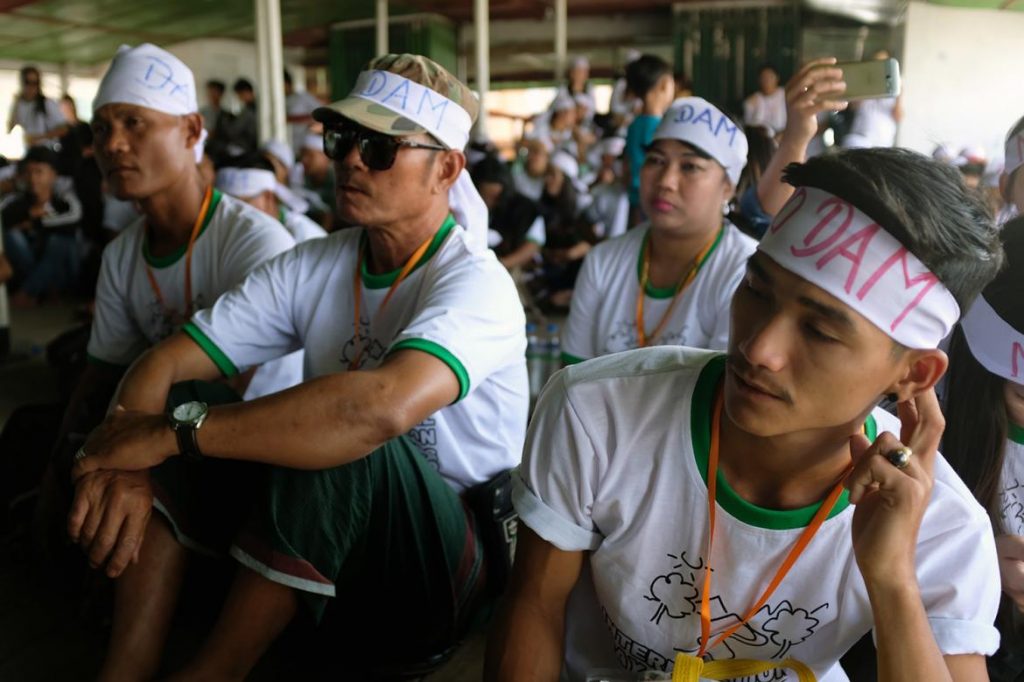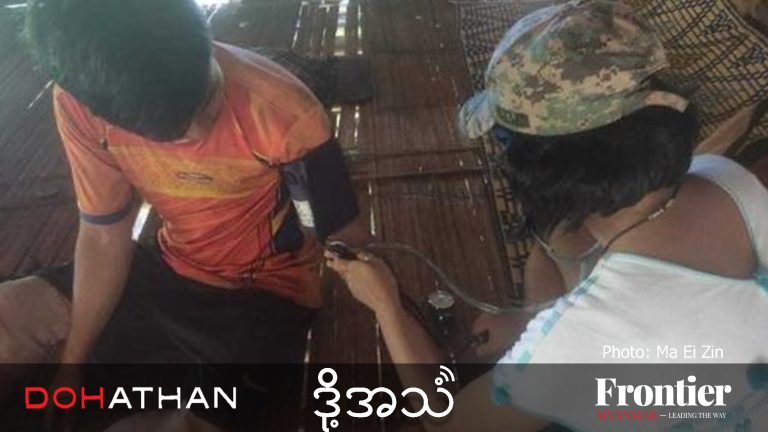By CLARE HAMMOND | FRONTIER
MANDALAY — Civil society groups from across the country convened in Mandalay on Wednesday and Thursday to protest against large-scale hydropower development on the country’s rivers, which they say is driving conflict and undermining efforts to build a democratic federal union.
On Wednesday at a conference in the city, panelists celebrated the country’s rivers and shared their experiences of hydropower development. They stressed the need for unity in the face both of increased pressure from China to resume construction of the Myitsone dam in Kachin State and the government’s support for mega-projects backed by international investors, on rivers that support large populations, many of which are in conflict areas.
In a boost for Chinese-backed mega-dams in Myanmar, many of which are now suspended or dormant, the Chinese government is advising the Ministry of Electricity and Energy on a new white paper for hydropower policy, as reported in January by Frontier.
The ministry has also backed away from endorsing a strategic environmental assessment of the sector drafted over the past two years with support from the International Finance Corporation, part of the World Bank Group, which recommends that five of the country’s mainstem rivers be reserved from hydropower development.
Support more independent journalism like this. Sign up to be a Frontier member.
On Thursday about 300 participants wearing “No Dam” headbands sailed on an industrial ferry along the Ayeyarwady River near Mandalay to mark the International Day of Action for Rivers. Participants said it was the first time civil society groups from across the country have come together to protest against hydropower.
At a press conference onboard the boat, protest leaders said they were “strongly opposed” to the Union government’s plans to build over 50 large hydropower dams on the country’s free-flowing rivers, mainly for the export of power to neighbouring countries. The groups define large dams as those larger than 100 megawatts.
“These dams directly threaten and exploit the fragile ecology of the rivers and the ethnic communities who rely on them for their survival and for the survival of their cultural heritage,” the groups said in a statement. “The government’s existing and proposed dam projects ignore the rights of ethnic communities to govern their own resources and maintain their cultural identities.”
At the event, Mandalay artist Suu Myint Thein performed an impassioned piece that included blowing a whistle and marching around the boat, wrapping himself in a black bin-liner, and pulling a length of red fabric over his head and body before rolling around on the floor.
As the crowd chanted “Ayeyarwady, Ayeyarwady, Ayeyarwady” he wrapped himself in blue fabric, donned a cat mask and pounced on the protestors, before throwing himself into the river.
On the same day in Bago Region, State Counsellor Daw Aung San Suu Kyi made rare public comments about the future of the Myitsone dam, urging people to consider the controversial project from “a wider perspective”.
Amid increasing pressure from China to resume the 6,000MW project, which was suspended in 2011 by former President U Thein Sein, Aung San Suu Kyi said of Myitsone, “We should not think based on one viewpoint.”
A final decision on the future of Myitsone and other large projects would need to be politically, socially, economically and environmentally sound and sustainable, she said, while promising that details of any decisions would be made public.
In a statement interpreted by commentators as a sign that Myitsone might go ahead despite widespread opposition to its social and environmental impacts, Aung San Suu Kyi said that if the government broke promises made by a previous administration then Myanmar would lose credibility with investors.
Organisers of the anti-hydropower event in Mandalay said the National League for Democracy took office in 2016 pledging to address the root causes of armed conflict and to establish a genuine federal democratic union.
They called on the government to suspend the ongoing construction of large dams, to abandon all planned and proposed large dams, and to demand that investors respect the rights of the people of Myanmar.
A separate event was held by Karen civil society on Thursday on the banks of the Thanlwin River, also known as the Salween. They demanded that all proposals for the construction of large dams on Myanmar’s rivers be “completely abandoned”.
In Kayin State, the proposed Hatgyi dam on the Thanlwin threatens to “flood and starve our ancestral territories, permanently displace us from our heritage, and inflame conflict and insecurity,” Karen Rivers Watch said in a statement. “For our Karen people the Hatgyi dam is a symbol [of] violence and a tool used by the Burma Army to occupy our territory.”
The US$2.6 billion, 1,360MW Hatgyi dam, which is currently dormant, was commissioned by the Electricity Authority of Thailand International, China’s Sinohydro Corp., Myanmar’s Ministry of Electricity and Energy and the International Group of Entrepreneurs.
In Mandalay, U Maung Maung Oo, a researcher for Sein Yaung So Activities and Natural Green Alliance, told Frontier that opposition to hydropower dams had been fragmented for too long. Because of the threat to cultures and traditions across the country, civil society needed “to work together inclusively” he said.
“We cannot [each] protect our own river and sacrifice others, we have to cooperate and be inclusive. That is why we are coming together to become a big force,” he said.
Communities have already developed their own local energy projects based on sustainable models that conserve forests, lands and waters, the event’s organisers said in a statement. “These locally-developed projects are a model for peace and representative of community-led democratic federal systems of governance.
“These existing democratic federal systems must be recognised as a central part of any political reform process … What we need is peace, not large dams”.







